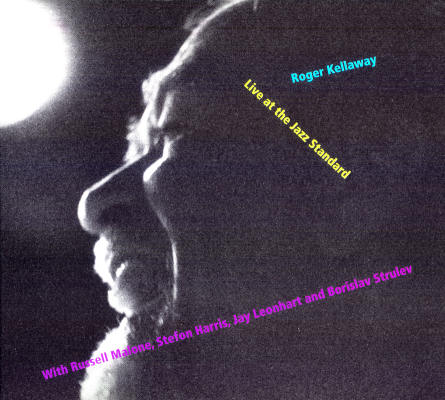Review by Jean Timmons
This recording, consisting of two discs, was made live at the Jazz Standard in New York over a four-night period. Kellaway appeared in a musical arrangement that he has favored of late, the "all wood" trio (piano, guitar Russell Malone, and bass Jay Leonhardt). This arrangement was used to exceptional effect by other notable jazz pianist, e.g., Oscar Peterson, Art Tatum, and Nat Cole. Kellaway's easy swing and technical prowess is reminiscent of Peterson, which is high praise, indeed. Kellaway is not well known on recordings, but he is well known amongst other jazz musicians. As characterized in the linear notes, he takes an "eclectic" approach to music. He played with Sonny Rollins but also Joni Mitchell; he’s written for Yo-Yo Ma and the Los Angeles Philharmonic; and he has film scores under his belt. At the Standard, Stefon Harris joined him on many pieces, but he was also joined by famed cellist Borislav Strulev the Kellaway composition "All My Life," which is almost too beautiful. (Strulev, who has also recorded with Regina Carter, makes the most of his guest spots with jazz musician.) But "All My Life" is but one of the excellent pieces on Disc One.
Both discs are very good; but Disc One is top notch, all-around. It opens with the speedy version of "Cottontail" to warm up the musicians. Next, "C Jam Blues" is pretty wild and features an adventurous improvisation by Kellaway. Stefon Harris is all over "Some Day My Prince Will Come" from the onset. He’s just humming and striking like the golden striker that he is. Kellaway's improvisational ideas are well blended, that is, he moves effortlessly and swiftly from one idea to the next. And he sings the lyrics so enchantingly. Initially, too, the guitar playing is sweet, and the timing of the bass player is impeccable. But then Kellaway picks up Harris' gauntlet and comes on strong. Then gradually, the other musicians decide to assert themselves. Guitarist Russell Malone jumps in firmly and then the bassist Jay Leonhart grabs the bow and sings a little, too.
The organization of the program increases the overall excellence of the music. From the rousing "Prince," they move on to the beautiful "All My Life." Then they segue to "I'm Beginning to See the Light," which is Kellaway minus Stefon and it's one of those fast, show-offy piano tunes for Kellaway to show off his chops, as Oscar and Art were wont to do. "Take Five" is a piece that Kellaway changes the tempo and shows his movie score background to me, for one passage is truly reminiscent of the score for "The Conversation." It is also a great piece for the guitarist, Russell Malone. This is a great piece. "The Nearness of You" is a piece for Stefon and he is great on this, such feeling, such dexterity, quick improvisational segments that form a whole yet are so distinct from each other. Disc One ends with a Sonny Rollins composition, "Doxy." All in all, a well-balanced program of music.
Disc Two begins with an unlikely tune for jazz improvisation, the country western "Tumbling, Tumbleweeds." But it has that kind of catchy lyric or melody, the kind that can stay in your head in spite of your better judgment, the kind that attracts a quirky mindset like Kellaway. He turns it into an opportunity to improvise on a simpleminded melody, to show off his nimbleness of mind. Sonny Rollins is notorious for that sort of thing as well, e.g., "The Tennessee Waltz." The recording of "Cherry," a Redman and Gilbert composition, is the platform to showcase guitarist Russell Malone and he steps up to the plate. Bassist steps in for a lively solo. The trio arrangement really complements each member. Coming back to wrap it up, Kellaway gets carried away, doubling up, tripling up, bringing back to memory the quick moves of Oscar Peterson. "You Don't Know What Love Is" is time for Stefon. There's an up tempo wail about this song that the vibes really capture well. "Freddie Freeloader" is a Miles Davis composition that is pretty for a Miles trumpet. Stefon gives it a ride. This is a rousing piece with an improvisational segment that calls for the instruments-vibes, piano, guitar, bass— to take off into a free world just following a chord. Kellaway really has fun on this piece. With Stefon joining him at the denouement to bring things back to Freddie. Kellaway wraps up the program with "52nd Street Theme," a Monk composition. Fast, pure bebop stuff with Malone taking up the reins to establish a swift groove. All musicians take gloves off and just jam on this last cut.
Excellent music that will create a well-deserved buzz on release.
Check out Roger's Web page
Check out
other recent CD reviews
Contact Brad Walseth and JazzChicago.net at
bwalseth60@aol.com
Return
to jazzchicago home
|

